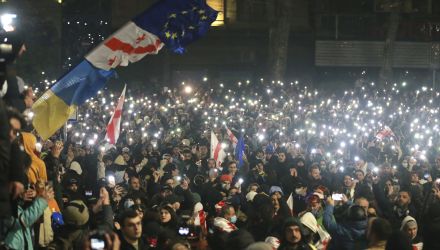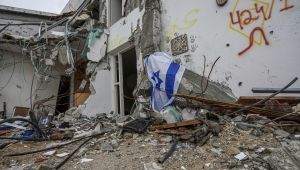BEIRUT -- Much of the speculation about whether Lebanon might be plunged into renewed strife in the months ahead revolves around the impact of the anticipated indictments by the Special Tribunal for Lebanon (STL) that was established by the UN to hold accountable those who murdered former Prime Minister Rafik Hariri and 22 other people since February 2005. The international investigation has generated enough evidence for the STL to say that it will hand down its indictments in the coming months. Beyond that, most of what is said about the investigation and the indictments -- and their consequences -- is speculation.
The immediate concern for Lebanon's wellbeing stems from the expectation that the STL will indict individuals who are associated with Hizbullah, whether active officials or "rogue elements." Hizbullah leader Hassan Nasrallah has publicly rejected such indictments, calling them a plot to diminish his movement's standing and clout. Some of his concerns are reasonable, such as questioning whether the STL investigation into the killings is tainted because of its heavy reliance on analyzing cell phone use patterns, when several Lebanese employees in telephone companies have been arrested as spies for Israel. He also questions the relevance and credibility of some Arab individuals interviewed by the investigators who changed their story.
These concerns could be addressed by the STL investigators, but the bigger question is not about the technical proficiency of the process, but rather its political dimensions. The fear is that if Hizbullah is linked with the murders it would use political or even military force to stop the process, perhaps by bringing the Lebanese government to a standstill. Hizbullah is the single most powerful military force in Lebanon, and in May 2008 it did not hesitate to flex its muscles and take over key sites in Beirut when the government tried to dismantle its security-related telecommunications system. Renewed war with Israel is also a concern, possibly related to an Israeli or Israeli-American attack on Iran, and any new war will ravage Lebanon to an inhuman degree.
The visit to Beirut last week by the Syrian president and Saudi Arabian king partly aimed to calm nerves and signal that these two Arab powerhouses sought a quiet rather than a violent Lebanon in the years ahead. Speculation is rife that a political deal will be made to minimize the impact of the indictments, though in truth we still do not know who will be indicted. When the STL was established some five years ago, many in Lebanon and abroad suspected Syrian-linked parties of carrying out the assassinations, whether these were ordered by the government in Damascus or the work of "rogue elements" in the Syrian security services. The evidence from the indictments will clarify such speculation, but for now one has to assume that all potential suspects -- Syria, Hizbullah, Israel, militant Islamists, criminal gangs, or anyone else -- should be assumed innocent until proven guilty.
The significant tension that now prevails pits two powerful forces against each other, with unpredictable results, but equally momentous consequences for Lebanon and the entire Arab world. On the one hand is the historic fact of the STL investigation and imminent trials, which aim to identify and hold accountable those who committed many murders. This historic move by the UN Security Council was necessary because the Lebanese government has been unable in the past half century to stop such political assassinations, and spontaneous, widespread outrage in Lebanon at the Hariri murder triggered a demand for the world to step in and bring to justice the killers.
On the other hand, there is a strong desire to maintain the calm and economic boom that have defined Lebanon since the May 2008 fighting, and to avoid renewed strife that might emanate from the political impact of the STL indictments if they accuse Hizbullah or Syrian parties. How to balance these two worthy imperatives -- justice and stability -- is Lebanon's great challenge today. A huge dilemma for the country is that most of the levers that will drive this process are in the hands of players outside the country, including Syria, Saudi Arabia, Iran, the United States, Israel and the UN Security Council. Events in Lebanon, as always, mirror wider tensions and deal-making in the region and globally.
If the imminent indictments mark the end of the investigation and the approaching start of the trials, the statements by Nasrallah and the Syrian-Saudi visit last week, for their part, mark the start of the political negotiations that will set the parameters for the STL's work. It will be difficult but not impossible to conclude a negotiated understanding that holds the killers accountable and sends a strong deterrent message to anyone contemplating such political murders in the future, while also preserving the calm that now prevails in Lebanon.
Rami G. Khouri is Editor-at-large of The Daily Star, and Director of the Issam Fares Institute for Public Policy and International Affairs at the American University of Beirut, in Beirut, Lebanon.
Khouri, Rami. “Lebanon's Great Balancing Act.” Agence Global, August 4, 2010





